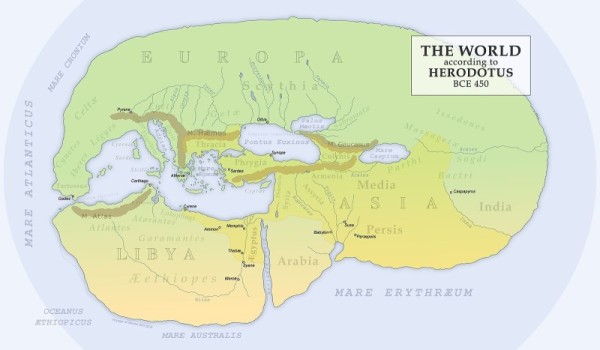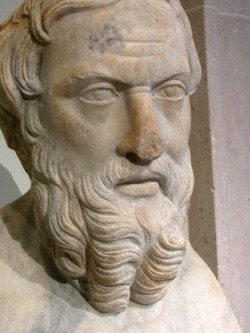After this king Darius took Samos before all other cities, whether of Hellenes or Barbarians, and for a cause which was as follows . . . .”

Translated by George C. Macaulay — our special project presenting the complete Herodotus with URLs for all of those people, places, events, and things which baffles and discourages modern readers.
Previously on Herodotus
137. The Persians then sailing thence and pursuing Demokedes reached Croton, and finding him in the market-place they laid hands upon him; and some of the men of Croton fearing the Persian power were willing to let him go, but others took hold of him and struck with their staves at the Persians, who pleaded for themselves in these words: “Men of Croton, take care what ye are about: ye are rescuing a man who was a slave of king Darius and who ran away from him. How, think you, will king Darius be content to receive such an insult; and how shall this which ye do be well for you, if ye take him away from us? Against what city, think you, shall we make expedition sooner than against this, and what city before this shall we endeavor to reduce to slavery?” Thus saying they did not however persuade the men of Croton, but having had Demokedes rescued from them and the ship of burden which they were bringing with them taken away, they set sail to go back to Asia, and did not endeavor to visit any more parts of Hellas or to find out about them, being now deprived of their guide. This much however Demokedes gave them as a charge when they were putting forth to sea, bidding them say to Darius that Demokedes was betrothed to the daughter of Milon: for the wrestler Milon had a great name at the king’s court; and I suppose that Demokedes was urgent for this marriage, spending much money to further it, in order that Darius might see that he was held in honor also in his own country.
138. The Persians however, after they had put out from Croton, were cast away with their ships in Iapygia; and as they were remaining there as slaves, Gillos a Tarentine exile rescued them and brought them back to king Darius. In return for this Darius offered to give him whatsoever thing he should desire; and Gillos chose that he might have the power of returning to Taras, narrating first the story of his misfortune: and in order that he might not disturb all Hellas, as would be the case if on his account a great armament should sail to invade Italy, he said it was enough for him that the men of Cnidos should be those who brought him back, without any others; because he supposed that by these, who were friends with the Tarentines, his return from exile would most easily be effected. Darius accordingly having promised proceeded to perform; for he sent a message to Cnidos and bade them being back Gillos to Taras: and the men of Cnidos obeyed Darius, but nevertheless they did not persuade the Tarentines, and they were not strong enough to apply force. Thus then it happened with regard to these things; and these were the first Persians who came from Asia to Hellas, and for the reason which has been mentioned these were sent as spies.
139. After this king Darius took Samos before all other cities, whether of Hellenes or Barbarians, and for a cause which was as follows:—When Cambyses the son of Cyrus was marching upon Egypt, many Hellenes arrived in Egypt, some, as might be expected, joining in the campaign to make profit, and some also coming to see the land itself; and among these was Syoloson the son of Aiakes and brother of Polycrates, an exile from Samos. To this Syloson a fortunate chance occurred, which was this:—he had taken and put upon him a flame-colored mantle, and was about the market-place in Memphis; and Darius, who was then one of the spearmen of Cambyses and not yet held in any great estimation, seeing him had a desire for the mantle, and going up to him offered to buy it. Then Syloson, seeing that Darius very greatly desired the mantle, by some divine inspiration said: “I will not sell this for any sum, but I will give it thee for nothing, if, as it appears, it must be thine at all costs.” To this Darius agreed and received from him the garment.

CC BY-SA 2.0 image from Wikipedia.
140. Now Syloson supposed without any doubt that he had altogether lost this by easy simplicity; but when in course of time Cambyses was dead, and the seven Persians had risen up against the Magian, and of the seven Darius had obtained the kingdom, Syloson heard that the kingdom had come about to that man to whom once in Egypt he had given the garment at his request: accordingly he went up to Susa and sat down at the entrance of the king’s palace, and said that he was a benefactor of Darius. The keeper of the door hearing this reported it to the king; and he marveled at it and said to him: “Who then of the Hellenes is my benefactor, to whom I am bound by gratitude? seeing that it is now but a short time that I possess the kingdom, and as yet scarcely one of them has come up to our court; and I may almost say that I have no debt owing to a Hellene. Nevertheless bring him in before me, that I may know what he means when he says these things.” Then the keeper of the door brought Syloson before him, and when he had been set in the midst, the interpreters asked him who he was and what he had done, that he called himself the benefactor of the king. Syloson accordingly told all that had happened about the mantle, and how he was the man who had given it; to which Darius made answer: “O most noble of men, thou art he who when as yet I had no power gavest me a gift, small it may be, but nevertheless the kindness is counted with me to be as great as if I should now receive some great thing from some one. Therefore I will give thee in return gold and silver in abundance, that thou mayest not ever repent that thou didst render a service to Darius the son of Hystaspes.” To this Syloson replied: “To me, O king, give neither gold nor silver, but recover and give to me my fatherland Samos, which now that my brother Polycrates has been slain by Oroites is possessed by our slave. This give to me without bloodshed or selling into slavery.”
– Herodotus, Book III
| <—Previous | Master List | Next—> |
Herodotus made his living by being interesting. In a world where most people did not read and could not afford to buy a book even if they could, they would pay to listen to Herodotus recite from his books. They would not pay to be bored. In that world, the names that populate his stories would have some general familiarity to his audience. Their obscurity to us is a barrier that this series seeks to break down.
MORE INFORMATION
MAP LIBRARY
Because of lack of detail in maps as embedded images, we are providing links instead, enabling readers to view them full screen.

Leave a Reply
You must be logged in to post a comment.